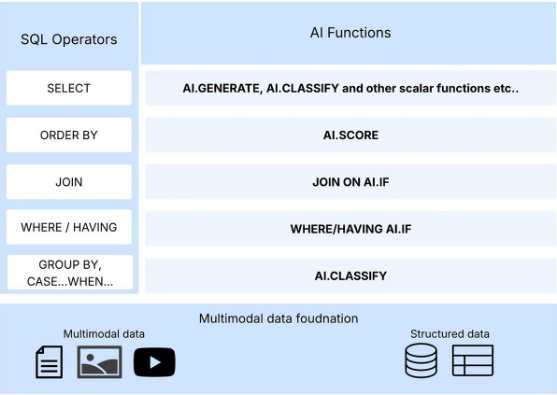| Google Announces BigQuery-Managed AI Functions |
| Written by Kay Ewbank | |||
| Thursday, 27 November 2025 | |||
|
Google has announced the public preview of BigQuery-managed AI functions. The three new functions let developers use generative AI for common analytical tasks directly within their SQL queries. Google BigQuery is a distributed, serverless SQL engine that provides a way to query petabytes of data. It has built-in machine learning, is serverless, and already supported Google Cloud.
The new functions are designed to make it easier to integrate LLMs into standard SQL flow without having to carry out prompt and parameter tuning for optimizing the quality of results. The new BigQuery-managed AI functions allow you to use generative AI for common analytical tasks directly within your SQL queries. There are three functions, AI.IF, AI.CLASSIFY, and AI.SCORE.
AI.IF can be used to filter and join data based on semantic meaning; AI.CLASSIFY provides a way to categorize unstructured text or images, and you can rank rows based on natural language criteria using AI.SCORE. With AI.IF, you can filter or join data using conditions written in natural language. The function can be used for tasks such as identifying negative customer reviews, filtering images that have specific attributes, or finding relevant information in documents. BigQuery optimizes the query plan to reduce the number of calls to LLM by evaluating non-AI filters first. AI.IF() can also be used for semantic joins, such as performing entity resolution between two different product catalogs. The AI.CLASSIFY function lets you categorize text or image based on labels you provide. Examples of its use would be to route support tickets by topic or classify images based on their style. AI.SCORE can be used to rank rows based on natural language criteria. Google says that to give consistent and high-quality results, BigQuery automatically refines your prompt into a structured scoring rubric. The three functions mean developers can mix AI processing with common SQL operators like WHERE, JOIN, ORDER BY, and GROUP BY. BigQuery handles prompt optimization, model selection, and model parameter tuning for you. The prompt optimization feature handles the problem that LLMs are sensitive to the wording of a prompt, meaning the way you phrase a question will affect quality and consistency. BigQuery optimizes your prompts into a structured format specifically for Gemini, helping to ensure higher-quality results and an improved cache hit rate. The functions also deal with query plan optimization. BigQuery query planner reorders AI functions in your filters and pulls AI functions out from joins to reduce the number of calls to the model, which saves costs and improves performance. Finally, BigQuery tunes model endpoint and model parameters to improve both result quality and results consistency across query runs. The new functions are available in preview now.
More InformationRelated ArticlesGoogle Announces BigQuery Metastore To be informed about new articles on I Programmer, sign up for our weekly newsletter, subscribe to the RSS feed and follow us on Twitter, Facebook or Linkedin.
Comments
or email your comment to: comments@i-programmer.info |



